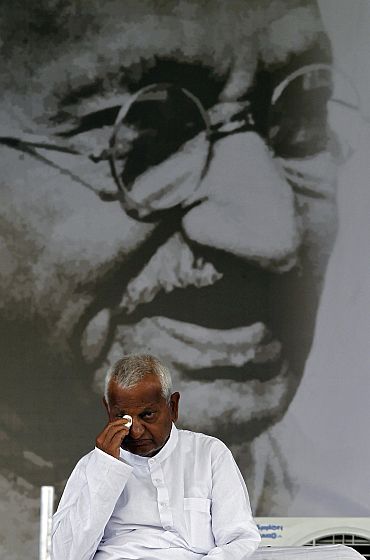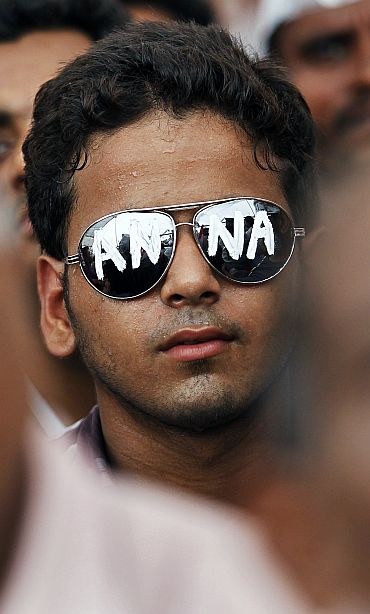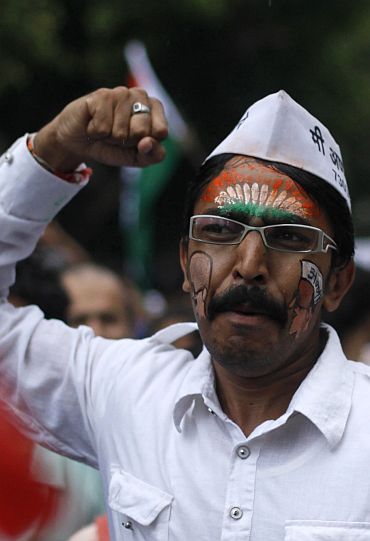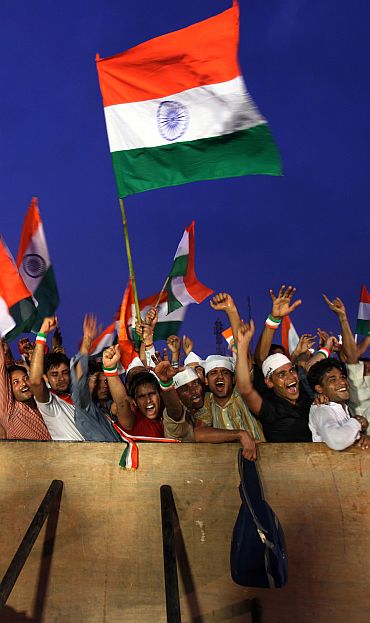
Mobs are being unleashed on politicians. The element of spontaneity is being used by organised groups as an excuse to defend and rationalise these acts. It would really be sad day for Indian democracy if the parliamentarians fail to resist this onslaught, says Apoorvanand.
When people are marching at the barricades, I went back to my library. I know that streets across India are now re-educating many of us and we are keen to get enrolled in this university of action. Yet I want first to understand this moment of action we are being advised to be part of.
Two chief leaders of the current 'movement against corruption' were on a television talk show hosted by Karan Thapar three days back. When asked why are they forcing Parliament to pass their version of the Lokpal bill without giving the members sufficient time to discuss and debate it, forget people who have been asked to make their representations to the standing committee, their reply was that the MPs can pass it in five minutes or two days at the most.
That it was robbing parliamentarians of their right to deliberate was not their concern. They kept on insisting that the bill has been lying with Parliament for more than four decades and therefore it has lost the right to ask for time to debate it anymore.
That this is a new Parliament and it cannot be held responsible for the action or inaction of the previous ones and here are new members who have a right to exercise and express their own minds did not sound convincing to them.
The question of views of the people has already been settled as it is the movement which represents the people and has it not already held a referendum on its version and improved it 13 times! What is the need then for seeking opinion from the people? When asked about the methodology they adopted for the referendum and whether it was sound enough, they contemptuously ignored the question.
They claim that it is through them that the people are speaking and it is the duty of persons like (National Advisory Council member and activist) Aruna Roy to convince them that there is some other way of looking at things. It was scary, very scary to see how cool and confident they were of the truth that they possess and how disdainfully they dismissed doubts about their approach!
They said that it was for those who hold a different view to come to them because the people are not with the likes of Aruna Roy but with them. And the people cannot wait more, they are frustrated and tired of being ruled and robbed by the corrupt for decades and now they want to get rid of them. A new grammar of impatience and frustration and a new moment for the 'victims' to take revenge! I saw a ghost of Hitler lurking behind these two suave, normal persons, darlings of activists across India and now the heartthrobs of millions! Was I hallucinating?
Please ....

I pulled out a small book from my bookshelf, titled Five Moral Pieces by Umberto Eco and look for his essay Ur-Fascism. Eco says that 'it is possible to draw up a list of characteristics typical of what I should like to call 'Ur-Fascism' or 'eternal fascism'.
These characteristics cannot be regimented into a system; many are mutually exclusive... But all you need is one of them to be present, and fascist nebula will begin to coagulate.' It would be educative to read further and try to see whether some crucial features listed by Eco are present in this movement against corruption or not.
Eco says that the first characteristics of Ur-Fascism is the cult of tradition. Traditionalism is older than fascism. Tradition has been employed very deftly by the leaders of this movement to touch, move and sway the masses to their tune. Friends are impressed by their wisdom to replace Bharat Mata with a Gandhi.
What they do not see perhaps is that this Gandhi is a wronged and martyred son of Bharat Mata and is in fact a caricature of what Gandhi actually was. Gandhi has already been integrated with its being by the Rashtriya Swayamsevak Sangh and Gandhians are happy singing his bhajans with them on January 30. The giant Gandhi backdrop which gives a cover to Anna is antithesis to everything that Gandhi stood for. But that is how traditions are deployed to their use by different forms of Ur-Fascism.
Vande Mataram with a tiranga is again a very creative mix of Hindu and nationalist emotions. What is wrong with a Vande Mataram in its new Rahman avatar is what many of us ask. Therefore, if you feel alienated with the chants of Vande Mataram, you better revise yourself. This movement has been trying combinations and permutations of diverse elements of tradition to create a new national moment.
Anna Hazare can invoke the warrior figure of Shivaji and yet remain a Gandhian. Militant memories of Subhash Chandra Bose, Bhagat Singh or Chandrashekhar Azad can be used as a resource to galvanise the youth. What is also very interesting is that in popular memory all of them have been portrayed as the victims of the machinations of a 'worldly' Jawaharlal Nehru-led Congress who deprived them of their due space in the national narrative.
Hazare is a good candidate to lead the movement. He is a celibate, who for the sake of the nation did not raise a family. His past as a member of Indian Army also helps. He is a simpleton and speaks a language which the masses understand easily. He can ask for death to the corrupt and yet remain non-violent because he can fast umpteen number of times. He is a doer. Many ministers in Maharashtra have resigned, forced by his power of non-violent fasts. So, he is also an achiever.
Hazare gives us solace because he sacrifices for us and the least we can do is to stand by him in his tapasya (penance). This would also fetch us punya (blessings). In our families a senior member, usually a woman, fasts and the whole family benefits. The act of fast itself is culturally appealing. All religions have their own versions of the act of fast. How can you call it coercive when it was employed by Gandhi? Invocation of Gandhi makes arguments about the nuanced nature of Gandhi-fasts redundant.

Eco says that traditionalism implies the rejection of modernism. It disguises as condemnation of the capitalist way of life, but mainly concerned a rejection of the spirit of 1789. In academic circles modernism already lies bloodied. The enlightenment and the age of reason, Eco says, were seen as the beginning of modern depravity.
Gandhi, the central traditional figure around which the yarn of this 'movement' is being spun, has been seen as a critic of modernity and interpreted as a potent source of post modern ways of thinking. He is also a votary of self sufficient gram-swaraj and was betrayed by his disciple who threw this dream aside.
Anna is again someone who has realised the Gandhi dream in his village. That his ideas about life, freedom and justice are pre-modern or irrational has been shown by studies done by scholars like Mukul Sharma.
The third characteristic of Ur-Fascism, according to Eco, is the cult of action for action's sake. Action is beautiful in itself, and therefore must be implemented before any form of reflection. Thinking is a form of emasculation. Critical attitudes are abhorred. We see that the appeal of parliamentarians or individuals seeking time and space to think is being spurned. Now is the time to act. And action would be perpetual.
The promise of permanent action and suspicion of intellectual life have always been the symptoms of Ur-Fascism. Thinking is done while acting. The parliamentarians are idlers.
Moreover, in our context, the idea of action itself has been made so elastic that watching repeated shows of the 'protest' on television becomes an action, sitting on your computer working on your Facebook, visiting Ramlila Maidan on a holiday with your family munching chips or gulping colas is also action. Television has extended the field of action to our bedrooms. So, all of us are actors while in actuality we are consumers of the grand spectacle of action.
The whole nation is feasting on a fast and relishing it. It is one of the safest, state protected protests we are witnessing after the anti- reservation stir led by the IITians and medical students. This is the second nationally televised movement after the anti- reservation movement. And please do not forget. Those young men and women did not a have an Anna hazare but they had also fasted.
It was their 'non-violent' fast which had forced the government to make reservation more 'equitable.' When we participate in action in this manner 24X7 we suspend thinking and brush aside ambiguities.
Eco says and we all know it that Ur-Fascism springs from individual or social frustration. He says that one of the characteristics typical of historic Fascist movements was the appeal to the frustrated middle classes, disquieted by some economic crisis or political humiliation and frightened by the social pressure from below. He also tells us that in our times the old proletariats are becoming petit bourgeois, and therefore fascism would have appeal for this new formation.
Recently Vinay Sitapathi in his articles in the EPW and the Indian Express talks about the changed character of the middle-class which is now largely employed with the non-state, -or private sector. He calls it the Shining India. This newly emerging class feels frustrated by the moves of the state like reservation and however cosmetically done, schemes for the minorities. It feels that they are impediments in its path and the State and Parliament is to be blamed for it since no political party has the guts to oppose it.
We now have a clearer picture of the way mobilisation for this 'movement' is being done, of the social composition of the youth which is loud in its support for Anna. The affinity that the anti-reservation agitationists feel with this anti-corruption movement cannot be explained away by saying that in a mass-movement like this there would be contradictory social voices co-existing.
This class is impatiently demanding, holding in disdain everything that has some connection with the State. Parliament, for this class is a waste in a time when we need to take fast decisions.
Echoing Marx we can say that the ideology of the ruling classes is the ideology of the masses and in our times the ruling mindset is that of this ambitious, ever consuming shining India with little patience for legal or parliamentary processes. The movement against corruption promises quick and final solution to the disease of corruption and is therefore appealing to the Shining India mindset.
A heightened sense of deprivation and an identifiable group as the source of it is another feature of Ur-Fascism. There has to be an enemy with vaunted wealth and power. Eco says that Hitler managed to persuade his people and other part of Europe that Jews were wealthy and helped one-another through a secret network of mutual assistance.
In India, Muslims have long been portrayed as illegitimately making claims to what should naturally belong to Hindus. So killing them on mass scale occasionally does not perturb Hindus. Now the taxpaying shining India has been persuaded that its money is being looted by politicians who seek shelter in and are secured by an institution called the Parliament.
This is the educated class which firmly believes every minute of Parliament is being paid by it and therefore Parliament has either to listen to it or disappear. Parliament has also been seen as an unholy network of politicians cutting across ideologies and parties which are actually helping each other in looting the people's money. The new source of loot is this political class and the war has to be against it.
Critics of the movement against corruption say that Parliament is a forum which does not speak in one voice. There are diverse voices, diverse sets of opinion and they should be allowed their space. But, as Eco says and I quote him, 'Ur-Fascism is based on 'qualitative populism'.
In a democracy the citizens enjoy individual rights, but as a whole citizens have a political impact only from a quantitative point of view. For Ur-Fascists... the people are conceived as a monolithic entity that expresses the 'common will'. Since no quantity of human beings can possess a common will, the leader claims to be their interpreter... the citizens are called upon... to play their role as the people. The people are thus merely a theatrical pretence."
The following lines of Eco sound very prophetic, "In our future there looms qualitative television or internet populism, in which a selected group of citizens can be presented and accepted as the 'voice of the people."
The future Eco is talking about is our present. What Eco says further is to be read carefully, "As a result of its qualitative populism, Ur-Fascism has to oppose 'rotten' parliamentary governments. One of the first things Benito Mussolini said in the Italian Parliament was, "I could have transformed this gray and sordid chamber into a bivouac for my soldiers."...every time a politician casts doubt on the legitimacy of a Parliament because it no longer represents the 'voices of the people', there is a suspicion of Ur-fascism."
The residences of ministers and MPs are being raided and Parliament is under an unprecedented seige. Mobs are being unleashed on politicians. The element of spontaneity is being used by organised groups as an excuse to defend and rationalise these acts. It would really be sad day for Indian democracy if the parliamentarians fail to resist this onslaught.

An atmosphere has been created where it is impossible to think. Thinking involves complex use of language. But, Eco says, "Ur-fascism uses newspeak... based on poor vocabulary and elementary syntax," the aim is "to limit the instruments available to complex and critical reasoning. But we must be prepared to identify other types of newspeak, even when they take the innocent form a popular talk show."
Newspeak is glorified as it helps simplify things. It is much harder and requires much time and energy when you invite people to participate in critical reasoning. It is easier to think of a tough, patriarchal institutional frame as suggested by the leaders of the movement against corruption. Newspeak thrives on the habit of sloganeering. It is also loud and clear and more often than not, eloquent and powerful. It makes a direct appeal to the emotions of the people.
That is what Anna Hazare does and his other educated leaders do when they make simple appeals, adopt tough postures. But communicability and eloquence can be deceptive, as noted lawyer and former Union minister Ram Jethmalani said recently in the Rajya Sabha participating in the debate on the impeachment motion against Justice Soumitra Sen, "Eloquence has nothing to do with morals. It is often the property of the biggest thieves and charlatans. Today glib-talkers are on top of the world and people who cannot talk are nowhere."
Another feature of Ur-fascism, one may add, is its ability to send different signals to different sets of people and rattle them by the sheer speed and force of its popular appeal. Political parties are forced to declare their stands, intellectuals are shamed into action or are called armchair thinkers and enemies of the people. Universities are called upon to move to the street where democratic education is happening.
Poets are asked to frame slogans. Leftists are tempted to join the chorus as the movement gives an illusion of open endedness which holds some promise for them as well. They fight pathetically to gain a space on the dais. Thus the movement gathers strength and respectability. But one has to watch out as Eco warns, 'Ur-Fascism is still around us, sometimes in civilian clothes.'
With Narendra Modi in 2002 it was easier to identify it. And life in 2011 has becomes much more complex. You would be mocked if you called Modi a fascist now. And it is even more difficult now to tear the khadi mask that some ordinary shirt and trousers clad persons like us are wearing and leading a movement against corruption.
What can be fascist about this movement and its leaders? But that is our job, in Eco's words, "to unmask Ur-fascism and to point the finger at each of its new forms -- every day, in every part of the world." It is unpopular to do so. So be it.